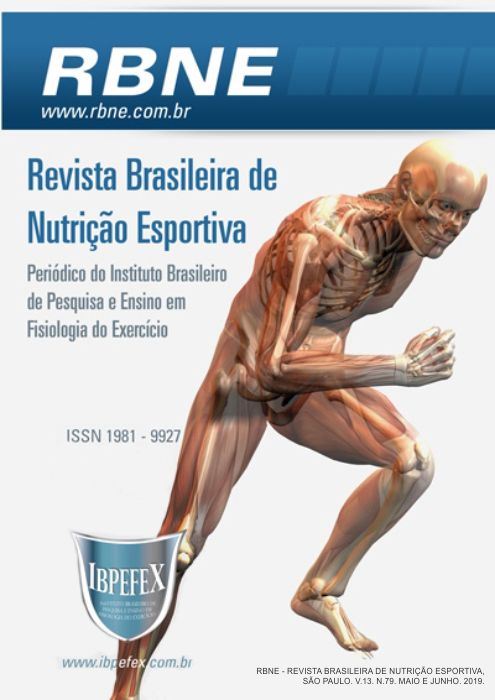Evaluation of the body composition of female athletes of the São Paulo olympic project of the Paulista Karate Federation
Abstract
Olympic combat sports (ECO) include Boxing, Judo, Taekwondo, Wrestling and currently Karate, included in the 2020 Olympics in Japan. The purpose of this field investigation is to record the body composition of high level competitive female athletes of karate, to fill a gap in the knowledge of this Olympic sport. Twenty-four high level athletes of the Federação Paulista de Karatê (FPK) of the Projeto São Paulo Olímpico were evaluated through a double indirect methodology to asses body composition. The athletes have body composition consistent with the competitive level evidenced by other studies with similar samples, however the number of studies in this subject is quite restricted. This research presents fundamental results for the recording and follow-up of a sample of female athletes of karate who can contribute to the design of performance strategies.
References
-Americam College of Sports Medicine. Nutrition and athletic performance. Medicine and Science in Sports and Exercise. Vol. 43. Num. 3. 2016. p. 543-568.
-Amusa, L.; Onyewadume, I. Anthropometry, body composition and somatotypes of Botswana national karate players: a descriptive study. Acta Kines Univ Tart. Vol.6. 2001. p. 7-14.
-Burdukiewicz, A.; Pietraszewska, J.; Andrzejewska J.; Stachoń. Morphological optimization of female combat sports athletes. Vol. 79. Num. 2. 2016. p. 201-210.
-Chaahène, H.; Hachana, Y.; Franchini, E.; Mkaouer, B.; Chamarf, K. Physical and Physiological Profile of Elite Karate Athletes. Sports Med. Vol. 42. Num.10. 2012. p. 829-843.
-Correia, W.R.; Franchini, E. Produção acadêmica em lutas, artes marciais e esportes de combate. Rev Motriz. Vol. 16. Num. 1. 2010. p. 01-09.
-Franchini, E. Born to fight? Genetics and combat sports. Revista de Artes Marciales Asiáticas. Vol. 9. Num.1. 2014.p. 1-8.
-Franchini, E.; Nunes, A.; Moraes, J.; Del Vecchio, F. Physical fitness and anthropometrical profile of the Brazilian male Judo Team. Journal of Physiological Anthropology. Vol. 26. Num. 2. 2007. p. 59‐67.
-Guedes, D.P.; Guedes, J.E.R.P. Controle do peso corporal: composição corporal, atividade física e nutrição. Londrina: Midiograf.1998. 311p.
-Jackson, A.S.; Pollock, M.L.;Ward, A. Generalized equations for predicting body density of women. Med Sci Sports Exerc. Vol.12. Num.3. 1980. p. 175-182.
-Milanez, V.F.; Dantas, J.L.; Christofaro, D.G.D.; Fernandes, R.A. Resposta da frequência cardíaca durante sessão de treinamento de karatê. Rev Bras Med Esporte. Vol. 18. Num. 1. 2012. p. 42-45.
-Organizacao Mundial de Saúde (OMS). Obesidade: prevenindo e controlando a epidemia global. São Paulo: Roca. 2004. 256p.
-Petroski, E.L. Antropometria: técnicas e padronizações. 2ªedição. Porto Alegre. Pallotti. 2003. 160p.
-Rossi, L.; Rocha, A.; Duarte, J.T.S. Avaliação do estado, conhecimento nutricional e imagem corporal de lutadores de artes marciais mistas. Revista de Artes Marciales Asiáticas. Vol. 12. Num. 2. 2017. p. 59-65.
-Rossi,L.;Tirapegui,J. Avaliacao antropometrica de atletas de Karate. R Bras Ci e Mov. Vol. 15. Num.3. 2007. p. 39-46.
-Rossi, L.; Tirapegui, J.; Castro, I.A. Restrição moderada de energia e dieta hiperprotéica promovem redução ponderal em atletas de elite de karatê. Rev Bras Ci Mov. Vol. 12. Num. 2. 2004. p. 69-73.
-Rossi, L. Artes Marciais. In: Hirschbrunch, M.D. Nutrição Esportiva: uma visão prática. 3ªedição. Manole. 2014. 496p.
-Rossi, L.; Caruso, L.; Galante, A.P. Avaliação Nutricional: novas perspectivas. 2ª edição. São Paulo. Roca. GEN. 2015. 412p
-Teshima, K.; Imamura, H.; Yoshimura, Y.; Nishimura, S.; Miyamoto, N.; Yamauchi, Y. Nutrient intake of highly competitive male and female collegiate karate players. J Physiol Anthrop Applied Hum Sci. Vol. 21. Num. 4. 2002. p. 204-211.
-Yang, W.H.; Heine. O.; Mester. J.; Grau, M. Impact of rapide weight reduction on health and performance related indicators os athletes representing the Olympic combat sports. Archives of Budo. Vol. 13. Num.1. 2017. p. 147-160.
Authors who publish in this journal agree to the following terms:
- Authors retain the copyright and grant the journal the right of first publication, with work simultaneously licensed under the Creative Commons Attribution License BY-NC which allows the sharing of the work with acknowledgment of the authorship of the work and initial publication in this journal.
- Authors are authorized to enter into additional contracts separately for non-exclusive distribution of the version of the work published in this journal (eg, publishing in institutional repository or book chapter), with acknowledgment of authorship and initial publication in this journal.
- Authors are allowed and encouraged to post and distribute their work online (eg, in institutional repositories or on their personal page) at any point before or during the editorial process, as this can bring about productive change as well as increase impact and impact. citation of published work (See The Effect of Free Access).






